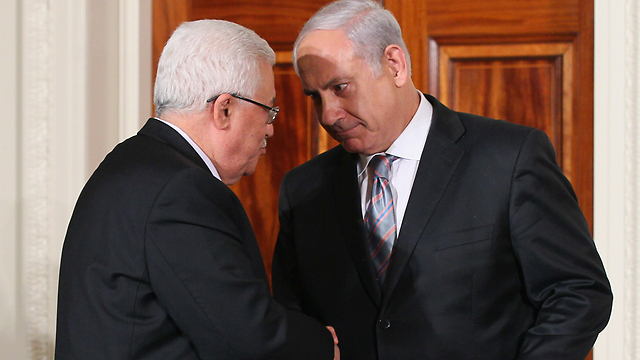
Contrary to the Right’s mantra, Abbas could have been the best partner for negotiations
Photo: AP

Israel is going to miss Mahmoud Abbas
Op-ed: Instead of preparing for the day after Abbas by rebuilding trust with Palestinians, Likud and Bayit Yehudi leaders are toying with the illusion that his successor will stop incitement and terror, accept the settlements and settle for a tiny autonomic Palestinian entity. What all of Abbas's potential heirs have in common, however, is the fact that they’re more hawkish than him.
In spite of his advanced age, his poor health—which his concerned doctors define as “excellent”—and his deep frustration over his failure to advance his people to an independent state, Palestinian President Mahmoud Abbas insists on holding on to the reins of power. Like other tyrants in the Middle East, he refuses to appoint a successor, groom someone or at least establish a system to select his heir.

In the Muqata’a, one must not mention the day after, although it’s clear to everyone that it’s approaching in huge steps. The Palestinians are entering a transit and waiting period, which will be followed by a vague future.
The Israeli government isn’t preparing for the day after Abbas either. Likud and Bayit Yehudi leaders are waiting for the departure of the person who they see as the source of all evil in the Palestinians' relations with Israel. They are toying with the illusion that his successor will be more moderate than he is, will stop the incitement, will stop terror. They are daydreaming that his successor will agree to changes in the Muslim control of the Temple Mount, will accept the settlements and will settle for a tiny autonomic Palestinian entity.

Prime Minister Netanyahu and Palestinian President Abbas in September 2010. The government missed the opportunity of his days in power to try to advance an agreement (Photo: Getty Images)
These hallucinations (which, for David Bitan and Miri Regev’s information, exist neither in the Shin Bet nor in the defense establishment) are completely detached from reality. Anyone listening to the discourse in the Palestinian street, elite and political leadership understands that there’s no desire to continue Abbas’ moderate way. As far as they’re concerned, he led the Palestinians to the lowest level of the compromise’s red line. What all the contenders in the inheritance battle—Mohammad Dahlan, Mahmoud al-Aloul, Majed Faraj or Marwan Barghouti—have in common is the fact that they are more hawkish than him.
What unites the Palestinians in their battle against Israel is the ethos of the conflict, focusing on the basic principles of the struggle, which include the establishment of a Palestinian state with Jerusalem as its capital, the right of return, the prisoner release and a refusal to recognize Israel as the Jewish people’s nation state. A leader who diverts from these principles won’t survive.
Abbas is good for the Jews, and he even benefits the Likud and right-wing government. He brought armed and organized terror to an end; he institutionalized the security cooperation, which IDF officers say is helping thwart terror; he stuck to the two-state vision, which he sees as giving up 78 percent of Palestine’s lands in favor of the Zionist state; he acted aggressively against Hamas and deepened the split between the West Bank and Gaza—one of the Right’s interests in its battle against the establishment of a Palestinian state; and his firm objection to pointless negotiations served the Netanyahu government’s interest to avoid peace talks.
It’s true that Abbas annoyed us with his de-legitimization moves and with his battle against the occupation in the international arena, but even without him, there would have been an opposition to settlements and there would have been international support for the two-state solution.
Contrary to the Right’s mantra, Abbas could have been the best partner for negotiations. The government missed the opportunity of his days in power to try to advance an agreement. But the right-wing government favors a nationalistic ideology, and is singlehandedly creating the infrastructure for a binational state with an Arab demographic majority in the Land of Israel. And it’s bad for the Jews.
By the way, the argument that without the security cooperation with Israel Hamas would take over the Palestinian Authority is groundless: It’s nothing more than an urban legend aimed at justifying the security cooperation on Israel’s part. Abbas has trained and obedient army forces, which have proved their ability to prevent Hamas from rearing its head in the West Bank even without Israel’s help.
Defense establishment officials are, rightly, concerned about the day after Abbas. Palestinian governmental stability guarantees security and could also help develop negotiations in the future. During this transit period, which no one knows how long it will last, Israel should therefore make some gestures, actions and activities which would at least indicate that it wishes to rebuild trust, in a bid to prevent anarchy on the day after.
Dr. Ronni Shaked, Yedioth Ahronoth's former correspondent and commentator on Palestinian affairs, is a research fellow at the Harry S. Truman Research Institute for the Advancement of Peace at Hebrew University.















